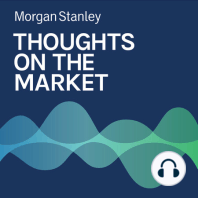3 min listen

Global Thematics: Emerging Markets Face Rising Debt Levels
Global Thematics: Emerging Markets Face Rising Debt Levels
ratings:
Length:
7 minutes
Released:
Mar 22, 2023
Format:
Podcast episode
Description
As investors focus on the risks of debt, can Emerging Markets combat pressure from wide fiscal deficits? Global Head of Fixed Income and Thematic Research Michael Zezas, Global Head of EM Sovereign Credit Strategy Simon Waever and Global Economics Analyst Diego Anzoategui discuss.----- Transcript -----Michael Zezas: Welcome to Thoughts on the Market. I'm Michael Zezas, Morgan Stanley's Global Head of Fixed Income and Thematic Research. Simon Waever: I'm Simon Waever, Morgan Stanley's Global Head of EM Sovereign Credit Strategy. Diego Anzoategui: And I'm Diego Anzoategui from the Global Economics Team. Michael Zezas: And on this special episode of Thoughts on the Market, we'll discuss how emerging markets are facing the pressures from rising debt levels and tougher external financing conditions. It's Wednesday, March 22nd at 10 a.m. in New York. Michael Zezas: The bank backdrop that's been unfolding over the last couple of weeks has led investors in the U.S. and globally to focus on the risks of debt right now. Emerging markets, which have seen sovereign debt levels rise in part due to the COVID pandemic, is one place where debt concerns are intensifying. But our economists and strategists here at Morgan Stanley Research believe this concern is overdone and that there might be opportunities in EM. Diego, can you maybe start by giving us a sense of where debt levels are in emerging markets, post-COVID, especially amidst rising interest rates globally? Diego Anzoategui: The overall EM debt to GDP ratio increased 11% from 2019, reaching levels above the 60% mark in 2022. Just a level, leveled by some economists, that's a warning sign because of its potential effects on the growth outlook. But without entering the debate on where this threshold is relevant or not, there is no doubt that the increase is meaningful and widespread because nearly every team has higher debt levels now. And broadly speaking, there are two factors explaining the rise in EM debt. The first one is a COVID, which was a hit on fiscal expenditure and revenues, overall. Many economies implemented expansionary fiscal policies and lockdowns caused depressed economic activity and lower fiscal revenues. The second one is the war in Ukraine, that caused a rise in oil and food commodity prices, hitting fiscals in economies with government subsidies to energy or food. Michael Zezas: And, Simon, while most emerging markets continue to have fiscal deficits wider than their pre-COVID trends, you argue that there's still a viable path to normalization against the backdrop of global economic conditions. What are some risks to this outlook and what catalysts and signposts are you watching closely? Simon Waever: Sure. I'm looking at three key points. First, the degree of fiscal adjustment. I think markets will reward those countries with a clear plan to return to pre-pandemic fiscal balances. That's, of course, easier said than done, but at least for energy exporters, it is easier. Second market focus will also be on the broader policy response. Again, I think markets will reward reforms that help boost growth, and inbound investment. It's also important as central banks respond to the inflation concerns, which for the most part they have done. And then I think having a strong sustainability plan also increasingly plays a role in achieving both more and cheaper financing. Third and lastly, we can't avoid talking about the global financial conditions. While, of course that's not something individual countries can control, it does impact the availability and cost of financing. In 2022, that was very difficult, but we do expect 2023 to be more supportive for EM sovereigns. Michael Zezas: And with all that said, you believe there may be some opportunities in emerging markets. Can you walk us through your thinking there? Simon Waever: Right. So building on all the work Diego and his team did, we think solvency is actually okay for the majority of the asset class, even if it has w
Released:
Mar 22, 2023
Format:
Podcast episode
Titles in the series (100)
Mike Wilson: Are U.S. Economic Indicators Flashing Yellow? by Thoughts on the Market